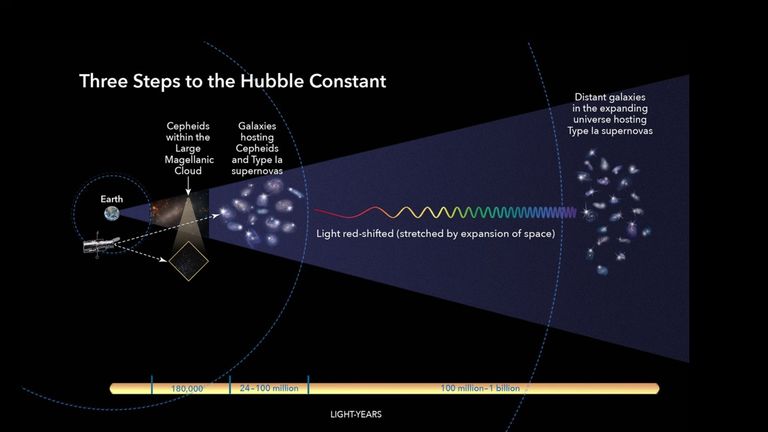New observations find universe expanding too fast for science
Astronomers have discovered a discrepancy between how fast the universe is expanding and how fast theories predict it should grow.
Friday 26 April 2019 10:42, UK
New observations captured by scientists suggest that the universe is actually expanding quicker than the laws of physics should allow.
The space between galaxies itself is stretching and astronomers can observe this expansion by measuring the light from distant galaxies, which turns redder as it passes through this stretching space.
By measuring this "redshift" scientists can calculate the rate of expansion - but astronomers have found a baffling discrepancy between what science predicts and what it actually observes.
Now, two new experiments from NASA and the European Space Agency (ESA) have established that this discrepancy is not the result of an accident during the measurement process, but rather a fact of the universe - which is expanding 9% faster than it should be.
"The Hubble tension between the early and late universe may be the most exciting development in cosmology in decades," said Professor Adam Riess, lead researcher in the paper which will be published in The Astrophysical Journal.
Professor Riess and colleagues won the 2011 Nobel Prize in Physics for providing evidence that the expansion of the universe was accelerating.
He said: "This mismatch has been growing and has now reached a point that is really impossible to dismiss as a fluke. This disparity could not plausibly occur just by chance."
"This is not just two experiments disagreeing. We are measuring something fundamentally different," he explained.
"One is a measurement of how fast the universe is expanding today, as we see it. The other is a prediction based on the physics of the early universe and on measurements of how fast it ought to be expanding.
"If these values don't agree, there becomes a very strong likelihood that we're missing something in the cosmological model that connects the two eras."
Among the theories to explain the mismatch are those which suggest the existence of concepts such as dark energy, dark matter, and dark radiation.
All of these hypothetical forms of matter or energy in the universe have been proposed as ways to balance these puzzling mathematical models.
Professor Riess said he doesn't have an answer to this "vexing problem" but explained his team will continue to use the Hubble Space Telescope to fine-tune their measurements of how quickly space is expanding.
Their goal is to decrease the uncertainty to 1% which should help astronomers identify the cause - whether dark matter, energy, or something else entirely.



